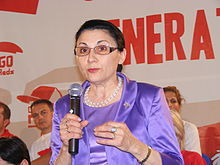Ecaterina Andronescu
| Ecaterina Andronescu | |
|---|---|

Andronescu speaking to a Social Democratic Youth audience in Otopeni, September 2009
|
|
| Member of the Chamber of Deputies of Romania | |
|
In office 22 November 1996 – 12 December 2008 |
|
| Minister of Education | |
|
In office 28 December 2000 – 19 June 2003 |
|
| President | Ion Iliescu |
| Prime Minister | Adrian Năstase |
| Preceded by | Andrei Marga |
| Succeeded by | Alexandru Athanasiu |
| Member of the Senate of Romania | |
|
Assumed office 15 December 2008 |
|
| Minister of Education | |
|
In office 22 December 2008 – 1 October 2009 |
|
| President | Traian Băsescu |
| Prime Minister | Emil Boc |
| Preceded by | Anton Anton |
| Succeeded by | Emil Boc (interim) |
| Minister of Education | |
|
In office 2 July 2012 – 21 December 2012 |
|
| President | Traian Băsescu |
| Prime Minister | Victor Ponta |
| Preceded by | Liviu Pop (interim) |
| Succeeded by | Remus Pricopie |
| Personal details | |
| Born |
7 April 1948 Malovăţ, Mehedinţi County |
| Nationality | Romanian |
| Political party | Social Democratic Party |
| Alma mater | Politehnica University of Bucharest |
| Occupation | Engineer |
| Website | Official site |
Ecaterina Andronescu (Romanian pronunciation: [ekateˈrina androˈnesku]; born 7 April 1948) is a Romanian engineer, professor and politician. A member of the Social Democratic Party (PSD), she sat in the Romanian Chamber of Deputies from 1996 to 2008, representing Bucharest, and has been a Senator since 2008, for the same city. In the Adrian Năstase cabinet, she was Education Minister from 2000 until June 2003. She held the same position in the cabinet of Emil Boc from 2008 to 2009, and once again in the Victor Ponta cabinet during 2012.
She is married and has one child.
She was born in Malovăţ, Mehedinţi County and became an engineer in 1972 upon graduation from the Oxidic Materials Science and Engineering department of the Politehnica University of Bucharest's Industrial Chemistry Faculty. In 1982, she earned a doctorate in the same field, and pursued further studies in Western Europe in the 1990s. From 1972 to 1983, she was an assistant lecturer at Politehnica, then lecturer from 1983 to 1990. From 1990 to 1994 she was a reader there, and she has been a professor at the same institution since 1994. From 1989 to 1992, she was assistant dean of the Industrial Chemistry Faculty, and dean from 1992 to 2004. She became the university's rector in 2004, serving until 2012. She has published over 155 scientific works in specialty journals in Romania and abroad; had over 60 scientific research contracts, including abroad; published three books; and has been awarded a patent.
In 1996, Andronescu joined the Party of Social Democracy in Romania (PDSR; PSD since 2001). She had been a secretary of state at the Education Ministry since the preceding year, and at the autumn 1996 elections (which the PDSR lost), she gained a seat in the Chamber and left the ministry. Until 2000, she was secretary of its committee on education, science and youth, continuing as a member until 2008.Re-elected in 2000, she was appointed to the incoming Năstase cabinet, serving until 2003, when Alexandru Athanasiu replaced her. As minister, she took a number of controversial decisions, including the reintroduction of a required examination for entering university faculties; the resumption of a high school admission examination; and a change in the method for correcting the baccalaureate. Critics charged that these "experiments" had introduced "anachronism and chaos" into the Romanian educational system, perturbing both pupils and teachers, and Andronescu's reputed inability to justify and sustain her decisions earned her the nickname of Abramburica (a coined term mixing abracadabra and brambura, "aimless").
...
Wikipedia
